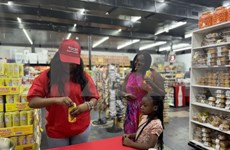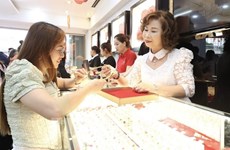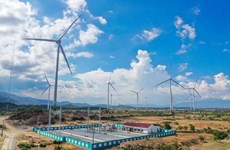Cargill sweet on cocoa production in Vietnam
"Vietnam has good potential for exporting cocoa," said Cargill Inc
senior vice president Paul Conway during a visit last week to the
southern province of Binh Phuoc, where Cargill has established its third
cocoa buying station in Bu Dang District.
"Vietnam has good potential for exporting cocoa," said Cargill Inc
senior vice president Paul Conway during a visit last week to the
southern province of Binh Phuoc, where Cargill has established its third
cocoa buying station in Bu Dang District.
Two other buying stations were established in Ben Tre and Dac Lac provinces in 2005.
"This is an important source of income for farmers in these provinces, and especially meaningful in diversifying Vietnam's agricultural produce and hard-currency exports," said Deputy Minister of Industry and Trade Nguyen Nam Hai.
Over 12,000 Vietnamese farmers have benefited from Cargill training in best practices for cocoa growing, harvesting and fermentation to help them produce high-quality cocoa beans for international markets.
Cargill has established over 100 cocoa demonstration farms, co-operated with the Ministry of Science and Technology to help establish Vietnamese cocoa standards, and collaborated with the Ministry of Agriculture and Rural Development to release approved cocoa varieties and help build up the value-chain for Vietnamese cocoa.
"Over the next few years, we will see that crop growing significantly and then ultimately we will put a processing plant here to put the added value in the country of origin," Conway said.
Cocoa cultivation also helps coffee farmers improve incomes when coffee price decline, with the price of cocoa beans on international markets being generally more stable than that of coffee.
Cargill produces a wide range of cocoa and chocolate ingredients to be used in bakery, confectionery, and dairy applications around the world.
To ensure good quality and secure a sustainable supply of cocoa beans, Cargill has its own cocoa bean sourcing operations for buying, handling and exporting in Brazil, Cameroon, Ivory Coast, Indonesia and Vietnam.
It buys over 70 percent of the nation's cocoa output and sells Vietnamese products across the globe./.
Two other buying stations were established in Ben Tre and Dac Lac provinces in 2005.
"This is an important source of income for farmers in these provinces, and especially meaningful in diversifying Vietnam's agricultural produce and hard-currency exports," said Deputy Minister of Industry and Trade Nguyen Nam Hai.
Over 12,000 Vietnamese farmers have benefited from Cargill training in best practices for cocoa growing, harvesting and fermentation to help them produce high-quality cocoa beans for international markets.
Cargill has established over 100 cocoa demonstration farms, co-operated with the Ministry of Science and Technology to help establish Vietnamese cocoa standards, and collaborated with the Ministry of Agriculture and Rural Development to release approved cocoa varieties and help build up the value-chain for Vietnamese cocoa.
"Over the next few years, we will see that crop growing significantly and then ultimately we will put a processing plant here to put the added value in the country of origin," Conway said.
Cocoa cultivation also helps coffee farmers improve incomes when coffee price decline, with the price of cocoa beans on international markets being generally more stable than that of coffee.
Cargill produces a wide range of cocoa and chocolate ingredients to be used in bakery, confectionery, and dairy applications around the world.
To ensure good quality and secure a sustainable supply of cocoa beans, Cargill has its own cocoa bean sourcing operations for buying, handling and exporting in Brazil, Cameroon, Ivory Coast, Indonesia and Vietnam.
It buys over 70 percent of the nation's cocoa output and sells Vietnamese products across the globe./.












